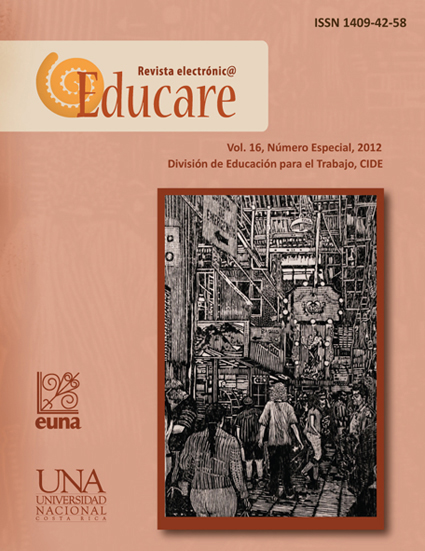Raising Awareness on Teacher Training Changes: Perspectives and Challenges
DOI:
https://doi.org/10.15359/ree.16-Esp.8Keywords:
Teacher training, change, transformation, complexity, communication, teacher role, willingness.Abstract
One of the numerous challenges in the educational processes is teacher training, particularly in the framework of neo-liberal global societies ruled by the competitiveness of regular and continuous education programs in teacher training. It is a matter of concern and, therefore, a matter of analysis, if we consider the deep impact in all contexts. Accordingly, this paper discusses the situation from a descriptive perspective as a basic requirement to go beyond the analysis on the urgency of having clear educational policies related to the variety and quality of curricular programs; and, above all, a strong awareness from teacher trainers to see themselves as the critical creative mass from which change can be made, based on socially human proposals.
References
Arroyo, J. A. (2001). Incidencia de los indicadores en la calidad de la educación. El significado del
concepto de calidad de la educación. San José, Costa Rica: EUCR.
Carrr, W. y Kemmins, S. (1988). Teoría crítica de la enseñanza: La investigación-acción en la formación
del profesorado. Barcelona: Martínez Roca.
Fourés, C. I. (julio-diciembre, 2011). Reflexión docente y metacognición. Una mirada sobre la
formación de formadores. Zona próxima, 14, 150-159. http://www.redalyc.org/src/inicio/
ArtPdfRed.jsp?iCve=85320028010
Freire, P. (2005). Pedagogía de la autonomía (3a
reimp.). Buenos Aires: Siglo XXI.
Giroux, H. (1990). Los profesores como intelectuales. Hacia una pedagogía crítica del aprendizaje.
Barcelona: Paidós.
Habermas, J. ( 1994). Teoría de la acción comunicativa. Racionalidad de la acción y racionalidad
social. Madrid: Taurus.
López, J. (2006). Desarrollo humano y práctica docente. México: Trillas.
Morin, E. (1994). Introducción al pensamiento complejo. España: Gedisa.
Pinto, R. (2012). Principios filosóficos y epistemológicos del ser docente. (Colección Pedagógica
formación inicial de docentes centroamericanos de educación primaria o básica, n. 60). San
José, Costa Rica: CEEC/SICA. Recuprado de http://www.ceducar.info/CEDUCAR/recursos/
biblioteca%20online/Volumen%2060/HTML/index.html#/45/zoomed
Quiroga, A. P. (1986). Enfoques y perspectivas en psicología social. Organización escolar y desarrollo
profesional (2ª. ed.). Buenos Aires: Cinco.
Santos, M. Á. (2001). Enseñar o el oficio de aprender. Organización escolar y desarrollo profesional.
Argentina: Homo Sapiens.
Downloads
Published
How to Cite
Issue
Section
License
1. In case the submitted paper is accepted for publication, the author(s) FREELY, COSTLESS, EXCLUSIVELY AND FOR AN INDEFINITE TERM transfer copyrights and patrimonial rights to Universidad Nacional (UNA, Costa Rica). For more details check the Originality Statement and Copyright Transfer Agreement
2. REUTILIZATION RIGHTS: UNA authorizes authors to use, for any purpose (among them selfarchiving or autoarchiving) and to publish in the Internet in any electronic site, the paper´'s final version, both approved and published (post print), as long as it is done with a non commercial purpose, does not generate derivates without previous consentment and recognizes both publisher's name and authorship.
3. The submission and possible publication of the paper in the Educare Electronic Journal is ruled by the Journal’s editorial policies, the institutional rules of Universidad Nacional and the laws of the Republic of Costa Rica. Additionally, any possible difference of opinion or future dispute shall be settled in accordance with the mechanisms of Alternative Dispute Resolution and the Costa Rican Jurisdiction.
4. In all cases, it is understood that the opinions issued are those of the authors and do not necessarily reflect the position and opinion of Educare, CIDE or Universidad Nacional, Costa Rica. It is also understood that, in the exercise of academic freedom, the authors have carried out a rogorous scientific-academic process of research, reflection and argumentation thar lays within the thematic scope of interest of the Journal.
5. The papers published by Educare Electronic Journal use a Creative Commons License:















 The articles published by Educare Electronic Journal can be shared with a Creative Commons License:
The articles published by Educare Electronic Journal can be shared with a Creative Commons License: 



